The Latest B2B Content Marketing Trends, Statistics and Insights for 2021

Content Marketing Institute and MarketingProfs recently released their B2B Content Marketing Benchmarks, Budgets, and Trends: Insights for 2021 research. The eleventh annual report is packed with findings collected from B2B marketers representing a full range of industries, functional areas and company sizes.
The 49-page report provides a snapshot of the current state of B2B content marketing while providing insight into how the most effective content marketers do things differently. The survey featured many of the same questions as last year but added additional questions to see how content marketers were faring in the midst of the Covid-19 pandemic.
As the findings support, content marketing is an evolving discipline and one that both marketers and organizations continue to work out as challenges persist. Content marketers are resilient and have met this year’s unique challenges and adapted their efforts quickly. Here are some key insights from the report:
Most companies have a content marketing strategy, but less than half have documented it
In this year’s survey, 79% of B2B marketers reported that their organization has a content marketing strategy. However, only 43% said their strategy was documented. There is a correlation between having a strategy and effectiveness, as 60% of the most successful content marketers have a documented content marketing strategy. The annual research has consistently found that a documented strategy is a key indicator of content marketing success.
The majority of those with a content marketing strategy made significant adjustments due to the pandemic
The Covid-19 pandemic has ushered in a host of changes for businesses in virtually every industry—especially when it comes to marketing. The pandemic has required businesses to respond quickly and the research found that 83% of B2B marketers made quick changes to their content marketing. Of those B2B marketers with a content marketing strategy, 70% made major or moderate adjustments to their strategy due to the pandemic. Of those who made adjustments, 80% felt the changes were effective. 22% view those adjustments as short-term while 66% view them as both short- and long-term. The top three changes made in response to the pandemic include updating targeting/messaging strategy (70%), adjusting the editorial calendar (64%), and changing the content distribution and promotion strategy (53%).
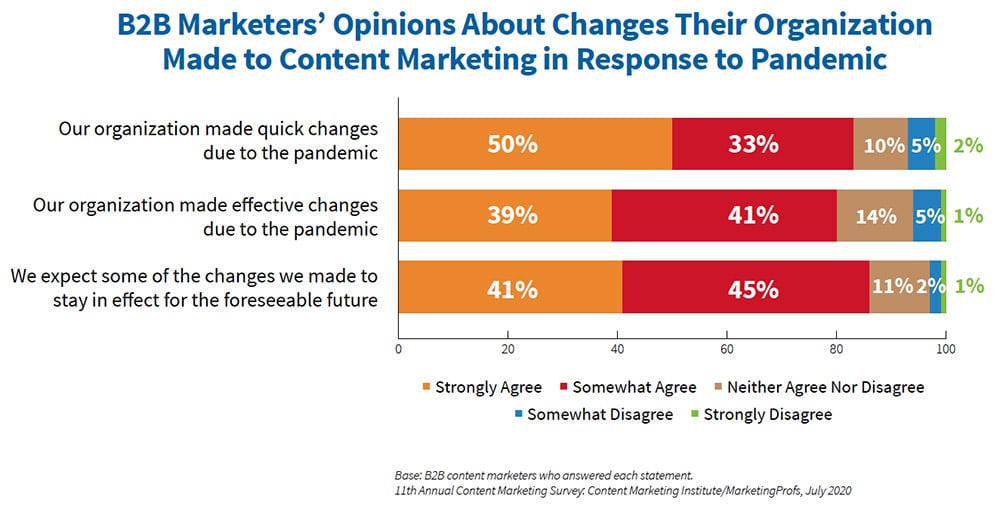
Most marketers consider their B2B content marketing efforts to be successful
This year’s report indicates the vast majority of marketers continue to achieve success with their content marketing and the discipline is thriving. When asked to rate the success of their overall content marketing efforts, this year 85% of marketers said their efforts were either extremely successful (5%), very successful (26%) or moderately successful (54%). A somewhat significant number of marketers (14%) considered their efforts minimally successful and only 1% reported their efforts to be not at all successful. B2B marketers who reported high levels of content marketing success (extremely/very successful) said the top two factors contributing to that success were the value their content provides (83%) and website changes (60%). On the flip side, marketers who reported low levels of content marketing success (minimally/not at all successful) said it was mostly due to content creation challenges (63%) and strategy issues (51%).
B2B marketers are using content marketing to successfully achieve goals
Over the last three years, the percentage of marketers reporting success with using content marketing to achieve various goals has increased. These goals include creating brand awareness (87%), building credibility/trust (81%), educating audiences (79%), generating demand/leads (75%), building loyalty with existing clients/customers (68%) and nurturing subscribers/audience/leads (60%).
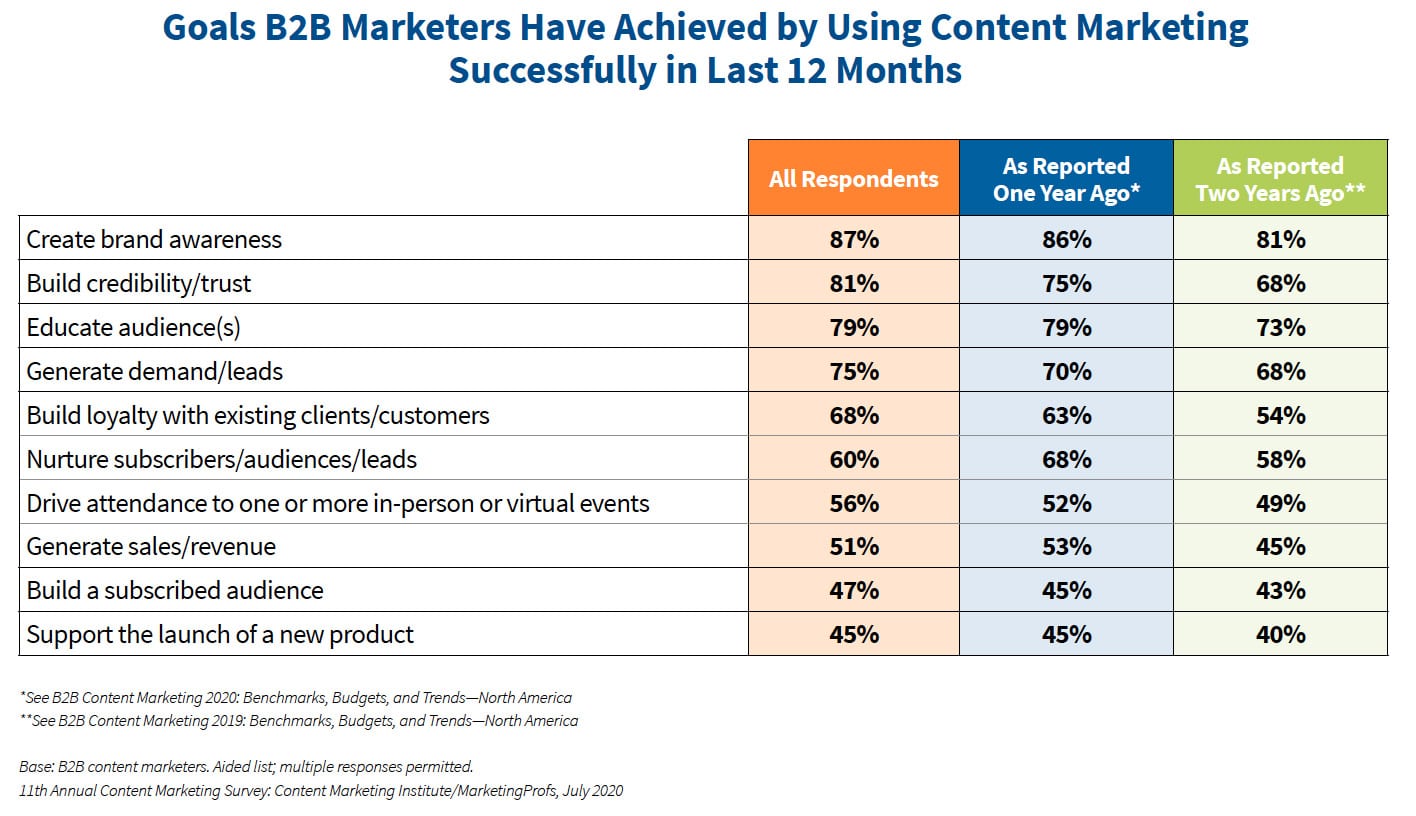
The majority of B2B companies track content performance
Highlighting the importance of metrics, 81% of B2B content marketers report their organization is using metrics to measure content performance. The top 5 metrics tracked to measure content performance are website traffic (90%), email engagement (86%), website engagement (84%), conversions (80%) and social media analytics (76%).
Blogging remains the cornerstone of content marketing
As in previous years, blog posts/short articles are the number one (93%) content type used by B2B marketers in the last 12 months. Following blog posts in popularity are email newsletters (77%), case studies (68%) and videos (68%). Of all the content types they use, B2B marketers reported that blog posts/short articles and virtual events/webinars/online courses (both tied at 22%) produced the best overall content marketing results for their organization in the last 12 months.
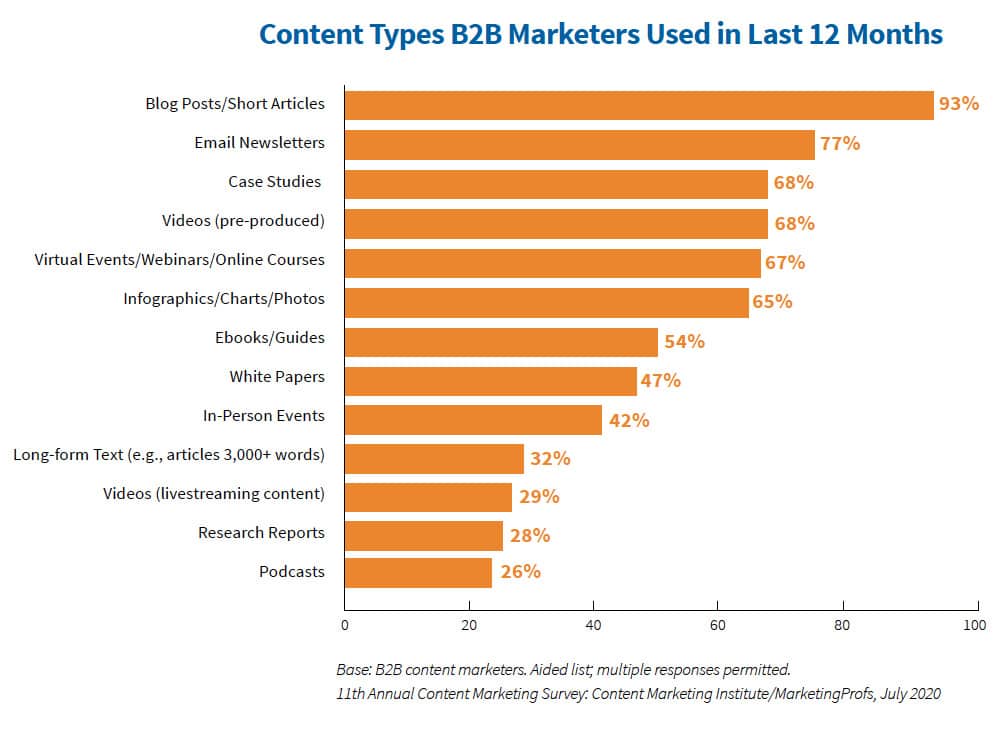
The Covid-19 pandemic has accelerated the use of virtual content
As a result of state-mandated quarantines and social distancing policies, in-person events have taken a major hit, while virtual content has seen sharp increases. Although it was one of the most popular content marketing methods in years past, the use of in-person events has decreased to 42% from 73%. But with the decrease in in-person events, the use of virtual events/webinars/online courses has increased to 67% from 57%. Similarly, the use of live-streaming content has increased to 29% from 10%.
Social media is an integral component of the distribution equation with LinkedIn as the top choice
While some may question the long-term relevancy of social media—especially for B2B audiences—social media has shown no signs of slowing down as a tool for B2B content marketers. In fact, 89% used social media as an organic content distribution channel in the last 12 months, with email marketing (87%) and the company website/blog (86%) as close seconds and thirds. Nearly all B2B marketers (96%) use LinkedIn for organic content distribution, as well as Twitter (82%), Facebook (82%), YouTube (62%) and Instagram (49%) rounding out the top five.
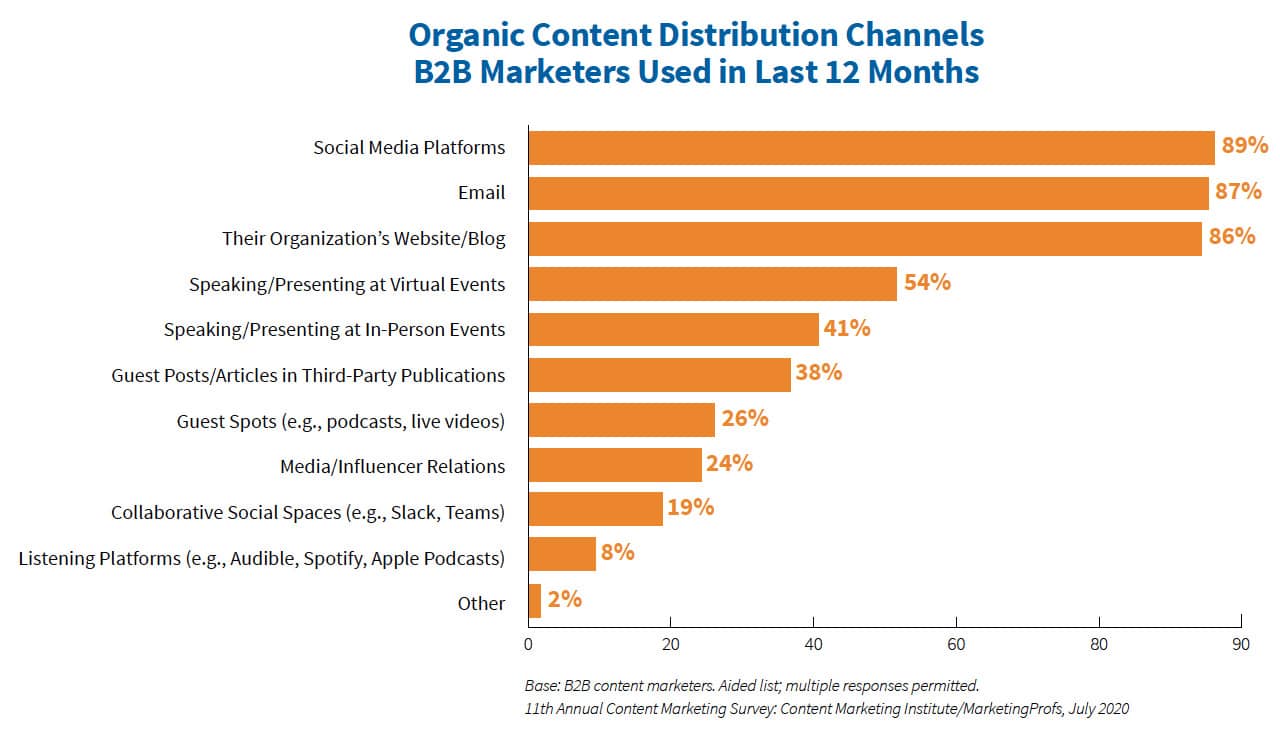
The majority use paid methods to distribute content
Paid amplification has become a widely used means of content promotion, with two-thirds of B2B content marketers having used paid methods to distribute content in the last 12 months. 72% of the B2B content marketers use paid methods to distribute content (down from 84% last year), and of that group 83% use social media advertising/promoted posts. Other paid content distribution channels include search engine marketing/pay-per-click (65%), sponsorships (60%), banner ads (48%), native advertising/sponsored content (35%) and partner emails (33%). When it comes to social media advertising and promoted posts, LinkedIn is the top choice (80%), followed by Facebook (67%), Twitter (27%), Instagram (26%) and YouTube (17%).
B2B marketers rely on technology for managing content marketing
As content marketing has grown as a discipline, so has the availability of digital technologies (often referred to as MarTech) that can be used specifically for content marketing. The top technologies B2B marketers use to assist with managing their content marketing efforts are analytics tools (88%), social media publishing/analytics (81%), email marketing software (78%), content creation/collaboration/workflow (58%), customer relationship management (CRM) systems (56%), content management (CMS) systems (53%), and content marketing automation (43%).
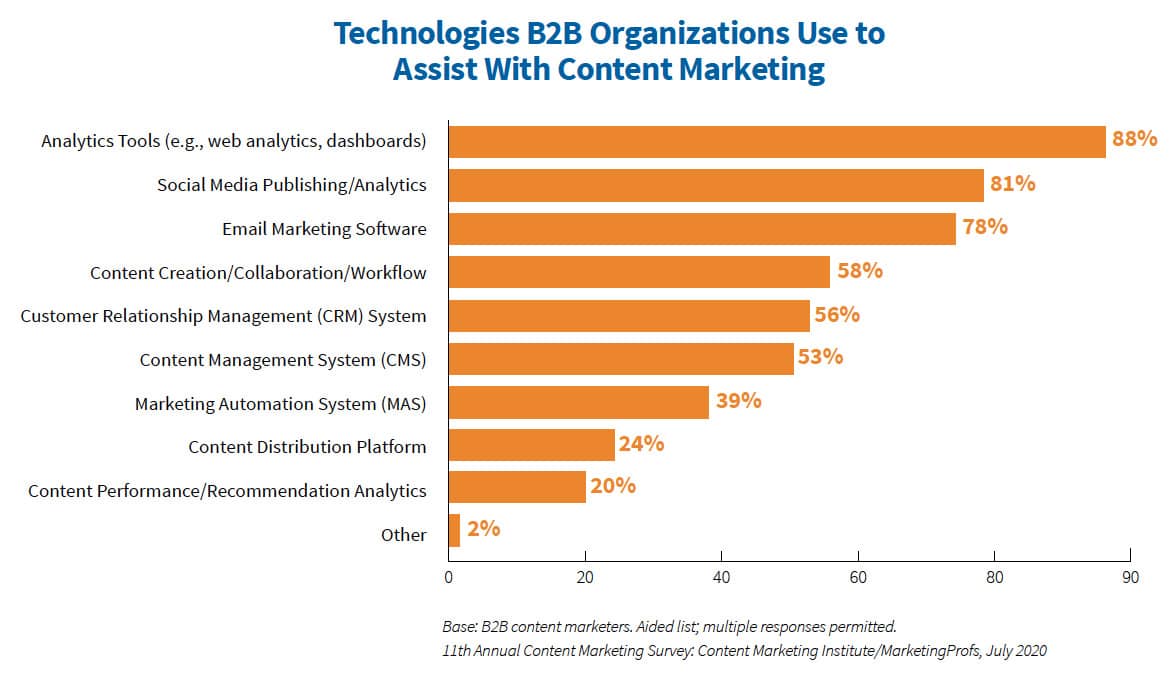
Small content marketing teams serving the entire organization is the most common team structure
The majority of marketers (55%) reported that their organizations have a small (1-5 dedicated people) content marketing team serving the entire organization. While only 11% of large organizations (1,000+ employees) have a large team (11 or more dedicated people), nearly half (43%) of medium organizations (100-999 employees) have 2-5 employees serving the entire organization. Interestingly, 35% of respondents reported that they have no one full-time dedicated to content marketing, while most companies regardless of size are most likely to have teams of 1-5.
Nearly half of B2B marketers outsource at least one content marketing activity
When asked about outsourcing, 49% of B2B marketers outsource at least one content marketing activity. Large firms are the most likely to outsource (61%), with small firms the least likely to outsource (37%). The activity most likely to be outsourced is overwhelmingly content creation (86%), regardless of company size, content marketing budget, or overall content marketing success. Interestingly, the top reported challenge for B2B marketers who outsource is finding partners with adequate topic expertise (69%).
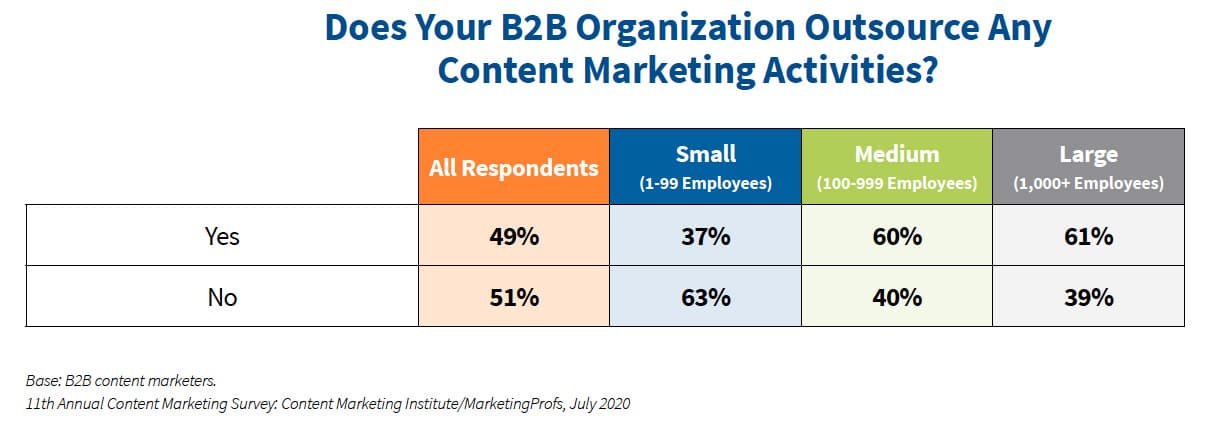
Half of B2B marketers indicated there was no change in their content marketing spending in the first half of 2020 as a response to the pandemic
53% of B2B marketers indicated there was no change in their content marketing spending in H1 2020 in response to the pandemic. Another 29% reported a decrease in spending, and 18% actually reported an increase. While 69% of B2B marketers expect their content marketing spending to stay the same (57%) or decrease (12%) in the second half of 2020 compared to the first half, nearly one-third (30%) expect their spending to increase. 36% of B2B content marketers reported a 2019 annual content marketing budget of less than $100,000, while the average reported annual budget for all respondents was $185,000. Not surprisingly, there was a direct correlation to budget size and content marketing success, as well as company size.
Read the full report
The annual report from Content Marketing Institute and Marketing Profs allows B2B marketers to check the pulse of content marketing and gain insight into its ongoing growth, maturity and evolution. There are many more insights in the report, in addition to the key insights that stood out to us. Download the complete report here: 11th Annual B2B Content Marketing Benchmarks, Budgets, and Trends: Insights for 2021.
"*" indicates required fields
By signing up you are agreeing to our Privacy Policy.